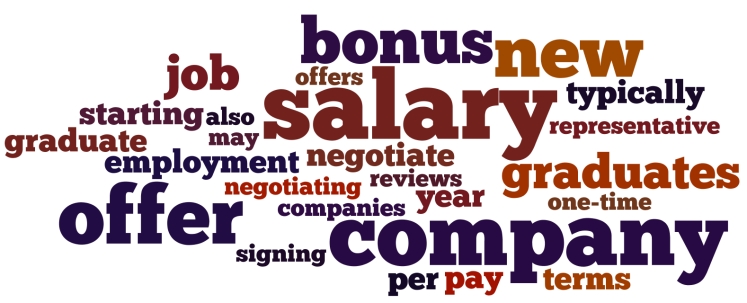
Survey responses indicate that of every hundred new McMaster Engineering B.Eng graduates thirty-five are still looking for a job just after completing their final examinations. Of the others, about three out of five, or 60%, have salary offers in the $55,000 to $75,000 per year range while 8% of respondents indicate that they will earn more than $75,000 per year.
Why this difference in starting salary? Do some new graduates negotiate their offers better than others? Are they able to convince their employers that they have more to offer?
Salary negotiation can be a risky proposition for new graduates. While negotiating, don’t be presumptuous, overconfident and smug. Discuss the terms in context. The company representative negotiating with you will respond best to enthusiasm and interest in the job and the company.
Think of it as problem-solving and hence make it collaborative.
Before negotiating the terms of an offer, do your homework. Information about starting salaries at a company and its competitors is often available on sites like Glassdoor, the LinkedIn salary section, and Salary.com.
Glassdoor also offers reviews of overall company culture, sometimes about specific departments and units. Take these reviews with a grain of salt. While crowdsourcing can be helpful, the veracity of these anonymous reviews cannot be entirely vouched for.
As a new graduate or a graduate in waiting, you will typically discuss the terms of your offer with a representative from the human resources, or talent acquisition, department of the company.
Try to not negotiate salary during an interview even if pressed. The time to do so is with the right company representative when you have an offer in hand. If asked about your salary expectation during an interview, say that you would like a fair salary consistent with the top company performers for the job or level you are being hired for.
Negotiations raise anxiety and cause stress for many people. Recognizing this, project yourself as a top performer by being calm and methodical through the process. Don’t respond to an offer, however tempting, at that moment you first review it. Asking for time to read over an employer’s offer and reflect on it is standard practice.
Out-of-classroom learning, for instance through co-op or extracurricular experiences, helps new graduates become noticed by recruiters. Even if these are extensive, most new graduates will not have as much to offer as their more senior counterparts do.
Starting salaries are set in a relatively tight range at most companies to avoid significant pay disparity between coworkers. When you ask for a higher salary, know that salary increases typically equal two to three percent per year. Asking for an increase in starting salary from $60,000 to $70,000 per year represents a sixteen-odd precent increase, which may be a bridge too far for the company to build that will meet your expectation.
However, some companies will entertain a one-time signing bonus, typically amounting to roughly five to ten percent of your starting salary. While this is not very common for companies to provide to fresh graduates, it is not uncommon either. Being one-time, a signing bonus allows the company to maintain internal pay equity while not losing you to the competition. The bonus also does not add a recurring cost to the company’s human resource budget.
It is likely that the signing bonus will commit you to employment with the company for a specific period, typically four to six months. You will have to return the bonus if you depart from the company prior to that period and pursue employment elsewhere.
In the long term, it is better for you to have a higher pay than a one-time cash bonus in hand. Forego the bonus if you can and have a portion, even half, added to your base pay. Your offer of employment may also come with terms for a yearly performance bonus or an equity option, both of which are financially meaningful. Consider these added sources of income along with your salary.
You will enter a negotiation expecting an employer to increase your compensation package. Concession is a two way street. Hence, you too should be prepared to walk back some of your expectations.
Being offered a high salary is an accomplishment. Focus, however, on what your first job entails since it will introduce you to a field and a network of colleagues and friends that you may spend years immersed in. Given that you will spend most of your waking hours working, reflect on whether this is this the right opportunity for you.
As a new graduate entering employment, while you have completed a valuable and memorable life experience, a new exciting phase of your life awaits you. With this optimism, be charming as you negotiate your job offer with your employer.
Good luck!
Be successful. Be happy. Be fulfilled.
Excellent advice!
LikeLike